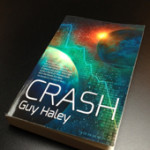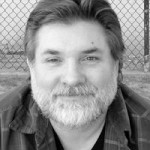A Conversation With Epic Fantasy Author Mark T Barnes
Australian author Mark T Barnes has recently released The Obsidian Heart, second in his Echoes of Empire Trilogy, and I’m delighted to introduce you to this breakthrough author in epic fantasy. He has just arrived back in Sydney after speaking at the World Fantasy Convention in Brighton. Mark and I are both published by 47North and in our little chat, here, we compare notes on world-building, opening scenes and short versus long form fiction.
Anne: Did the first scene in A Garden of Stones come to you in a blinding flash, Mark, or did it take time to work out how to handle the opening?
Mark: The first scene was always going to be one of conflict, to set up the tone for the rest of the story. We see treachery and loss of life from the get-go. I wanted to plunge the reader into the whirlwind, to immerse them in what the characters felt. Originally the first scene was told from the antagonist’s point of view, which made it darker. Given the nature of people to often imprint on the first character(s) they meet in a story, I retold it from Indris’s point of view as somebody caught up in the effect, rather than the person being the cause of events.
Congratulations on the publication of A Calculated Life, Anne. You chose to write about a dystopian world. What was it about a dystopian society, particularly what could be described as a near future dystopia, that fascinated you?
Anne: That’s an interesting decision you made for the opening of your novel – to have Idris as the opening POV.
As for my near-future setting… I’m told that it’s risky to set a science fiction novel in the near future because some SF readers will feel there’s not enough futuristic stuff for their taste. But my SF reading has always leant towards dystopias and particularly those set on Earth – whether they’re the result of an apocalypse or created by a totalitarian regime.
A near-future novel can be very effective in reflecting back on today’s society. In A Calculated Life, I was able to suggest where current technological changes, and changes in society, might lead in the foreseeable future. So it can be seen as a political enquiry as well as offering an exciting imaginative leap into the near-future.
You write fantasy and I wonder if this allows you to write no-holds-barred. Or can it be daunting to write in this genre in terms of world-building?
Mark: Like any story, there need to be rules and boundaries to give it the semblance of realism. I don’t know that having a no-holds-barred approach would work, unless you went for something comedic, where both writer and reader were having some deliberate fun, or established from the beginning that the rules were that there were no rules.
Any kind of fantasy world building is daunting, in that there are a number of well loved fantasy worlds with which readers have become familiar. The reason they’re so well loved is that they strike a chord with the reader. Finding something unique, or at least sufficiently different from what has come before, is as challenging as it is rewarding. That said, by knowing what has come before it’s relatively easy to see where there is room to move: in The Echoes of Empire books I moved away from Europe, away from the Dark Ages, away from a patriarchy, away from orthodox religion, etc. Doing anything new is always a risk, and there are no guarantees that readers will respond positively.
For me, it’s important that the world is layered, consistent, and feels like it could exist somewhere. Everything and everybody has a history, and that history informs much of who we are, what we do, what we know, and how we act. Society should make sense, otherwise it would collapse. Characters should fit in, and react realistically to, the world around them, or else they’d be pretty short lived. Daunting or not, world building makes you think not only about your story, but what regulates it, what causes have what events, and what makes things tick.
Anne, you’ve built a rich and believable world in A Calculated Life. Before becoming a published author, you were a journalist. How much of that discipline for social and cultural representation, the analysis of events delivered into the public domain, influenced your choice of topic, your point of view character, and the world you built? Or are your skills as a journalist and skills as a novelist worlds apart?
Anne: Well, I suppose as a reporter I was accustomed to presenting two sides of an argument. That discipline fits pretty well with writing a dystopian novel because one person’s dystopia is another person’s utopia. I present this utopian/dystopian world through the eyes of a single character, Jayna. She starts out with an accepting, almost innocent, view of the world. But a string of events raise doubts in her mind and she eventually recognizes that her allotted role in life isn’t such a good deal. She becomes attuned to seeing the flip side.
There are indeed common skills involved in writing news stories and fiction – research, for example. But with fiction, you create something out of nothing whereas a news story involves presenting a series of facts, and stringing together quotes. When I began writing my novel, I soon realized that whereas punctuation is a straightforward matter for a news story, in fiction the rules are open to interpretation.
I’m interested to see that you took a Clarion South writers’ workshop. Can you tell me how that helped you?
Mark: Clarion South was great for exposing me to other writers, as well as mentors with experience in the industry. It was invaluable to make some new friends with a shared passion for writing, mentors to help navigate some of the pitfalls of turning writing into a career, and of course to hone writing skills.
You mention how the rules are open to interpretation. Did you find challenging the rules, or outright breaking them, a difficult transition?
Anne: It was a breath of fresh air!
Hey, I thought we might talk a bit about our current writing projects. I’m writing short stories and I wondered, Mark, if you’ve written short form. Is it something you’re interested in as a reader?
Mark: I have written short form, and had some short stories published. I may go to writer hell for this, but I don’t enjoy either reading, or writing, short form all that much. My style, my love of intricate and layered world building, and the way I think, is definitely more suited to long form. Props to those who enjoy short form, and produce great stories: I respect that talent, in part because I don’t have it.
What was it that drew you to writing short form, after producing your novel?
Anne: In fact, my novel started out as a very short story. I realized it needed a longer form! Initially I thought it might become a novella but I then decided to go the whole hog and write a novel.
I think my natural tendency is to keep a story to the absolute essentials though I do get frustrated with myself when I keep cutting and cutting. So, for me, writing a short story avoids that anxiety. It’s fun to write, for example, a conversation between two people and then add thin layers – layers that hint at each character’s motivation. Eventually, the reader gets the full picture. That reminds me… as a journalist it’s difficult to know when you’ve dug out the full story. You can come away from an interview with a good story, but you’re not sure if you’ve got THE story. I think that’s relevant here. Hmm.
So, you are working on the third book in The Echoes of Empire trilogy. Do you already have ideas for what comes next in your writing career? Would you like to write a stand-alone novel or will you keep building around the trilogy? A new trilogy that links to the original trilogy?
Mark: I delivered The Pillars of Sand, third book in the series, mid-September. The edits have come back and are being worked on, though there’s not a lot to do, which is great. The Echoes of Empire was planned to be longer than three books, something discussed between my agent, the publisher, and myself, prior to the contract being signed. I’ve also proposals for other stories: an urban fantasy quartet (that I’ve started writing); some steampunk; and some sci-fi.
I’m having a meeting with my agent this week at WFC2013 to discuss what comes next. Though I’m writing the urban fantasy, there may be a preference to keep writing the Echoes stories. I’ll see how things pan out in the next day or so.
Do you think you’ll continue with long form fiction, spend more time on short form, or allow your stories to dictate how much time they need to be told? Would writing an anthology of related stories interest you?
Anne: That’s an impressive list of projects you have there! Good luck with the urban fantasy that you’ve started.
I do prefer to let the story dictate the word count. And I feel we are fortunate, Mark, to have a publisher who is evidently flexible on story length.
And your last question is incisive because I’m writing my short stories on a theme, which picks up on a specific storyline in A Calculated Life. I have an itch to write much more on the subject. But I’m not going to jinx the project by being more specific. I’m aware that I might veer off in another direction! So, I’ll report back when it’s nearer completion.
Thanks so much, Mark, for your great questions and I’ll look forward to hearing more about your trip to the World Fantasy Convention.






Trackbacks & Pingbacks
[…] T BARNES INTERVIEWS AND GUEST POSTS ANNE CHARNOCK SUZANNE CHURCH THE SCIFI SHOW […]
[…] T BARNES INTERVIEWS AND GUEST POSTS ANNE CHARNOCK SUZANNE CHURCH THE SCIFI SHOW […]
[…] T BARNES INTERVIEWS AND GUEST POSTS ANNE CHARNOCK SUZANNE CHURCH THE SCIFI SHOW […]
Leave a Reply
Want to join the discussion?Feel free to contribute!